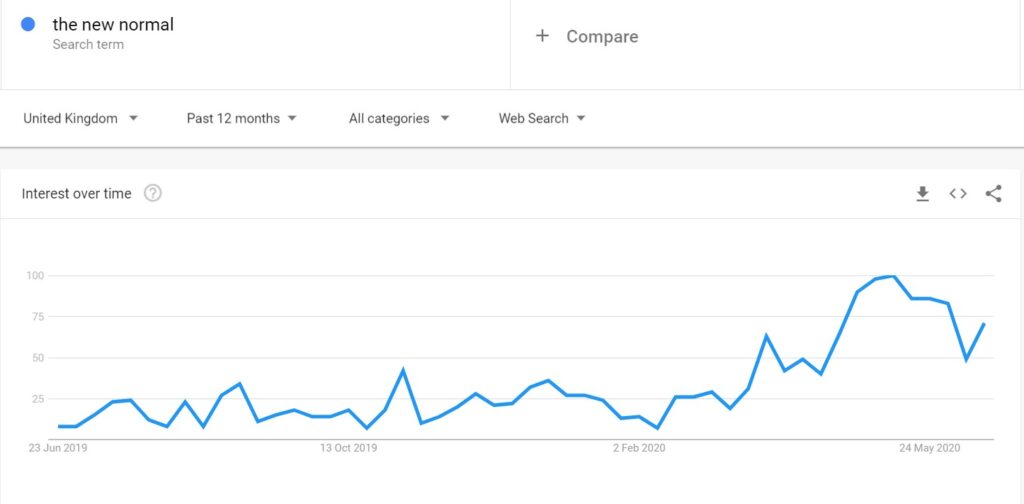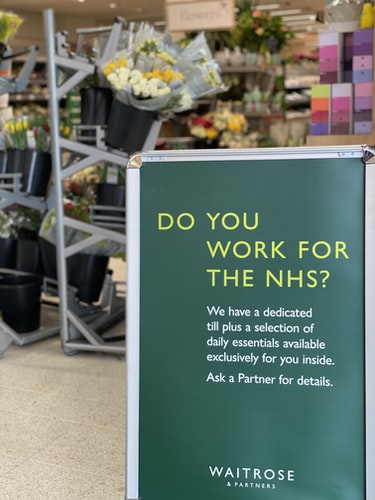3 changes we hope businesses keep as we move into the ‘new normal’.
While we’ll be glad to see the back of the tough time this ‘new normal’ is putting on businesses, you may be surprised to hear that we are hoping for a few business changes to stick around post COVID-19.
‘The New Normal’: as the Google Trends graph below shows, it’s all we’re all talking about at the minute. So, we thought we’d jump on the bandwagon and give you our thoughts on this ‘new normal’ from a marketing perspective.
While we’ll be glad to see the back of the tough time this ‘new normal’ is putting on businesses, you may be surprised to hear that we are hoping for a few business changes to stick around post COVID-19.

Flexible Strategies
In our pre-COVID lives businesses would often stick with a marketing strategy for years. In fact, most businesses had the mantra ‘if it’s not broken, don’t fix it’.
Then, along came COVID-19 which shattered every marketing strategy, business goal and plan to absolute pieces. Plans and strategies that had been years in the making were discarded and replaced by new, adaptive strategies in a matter of weeks. Businesses adopted new innovative strategies, brick and mortar stores built websites in record time, and all of us embraced the digital world with open, if wary, arms in a bid to survive these tough times.
Although we hope businesses are never faced with such turbulence again, we do hope that this open-minded enthusiasm for new strategies and the digital world remain as we return to the ‘new normal’. After all, flexible, digital strategies are what drive business growth and help to keep experiences fresh and exciting for consumers.


Priority Shopping
If the pandemic and lockdown has taught us anything it’s that business and indeed society as a whole should be a lot more flexible and accommodating.
Following stockpiling and humongous queues for shopping centres, most major supermarkets introduced much-needed priority shopping hours for the elderly, vulnerable and NHS workers.
As I think our ‘new normal’ shopping hours prove, priority shopping hours introduced in the lockdown and pre-COVID initiatives such as Autism Hour, should become the norm in our society. Contrary to pre-COVID beliefs, setting apart allocated, priority hours doesn’t inconvenience other shoppers, nor does it lessen the profits of shops. Instead, they ensure shopping is fair and accessible for all shoppers and actually improve consumer perception of retailers who adopt such measures.
Extended Returns
During the UK lockdown, we’ve seen retailers significantly extend their returns period to make it easier for customers to return and to encourage online sales despite physical shops being closed. But, these more flexible, extended returns shouldn’t stop when shops reopen.
Traditionally, retailers offer a 28-day return period as standard. Although this may seem a long time, as most of us know, in reality it isn’t. Just think, how often have you missed a returns period and either been stuck with an unwanted item or lumbered with a credit note? Way too often, I’d say.
That’s why we’d like to see the extended returns period that’s been introduced during the UK lockdown implemented as we move into the new normal. Longer returns offer customers increased flexibility and put customers at the heart of the buying cycle, two points that are crucial to hooking and retaining customers in these turbulent times.

As we move across into the ‘new normal’ we’re sure that new business strategies and consumer experiences will rise to the forefront, some of which we’ll be eager to keep and others we’ll be desperate to discard. Let us know in the comments what business traits you’re enjoying in the ‘new normal’.
Like it? Share it

